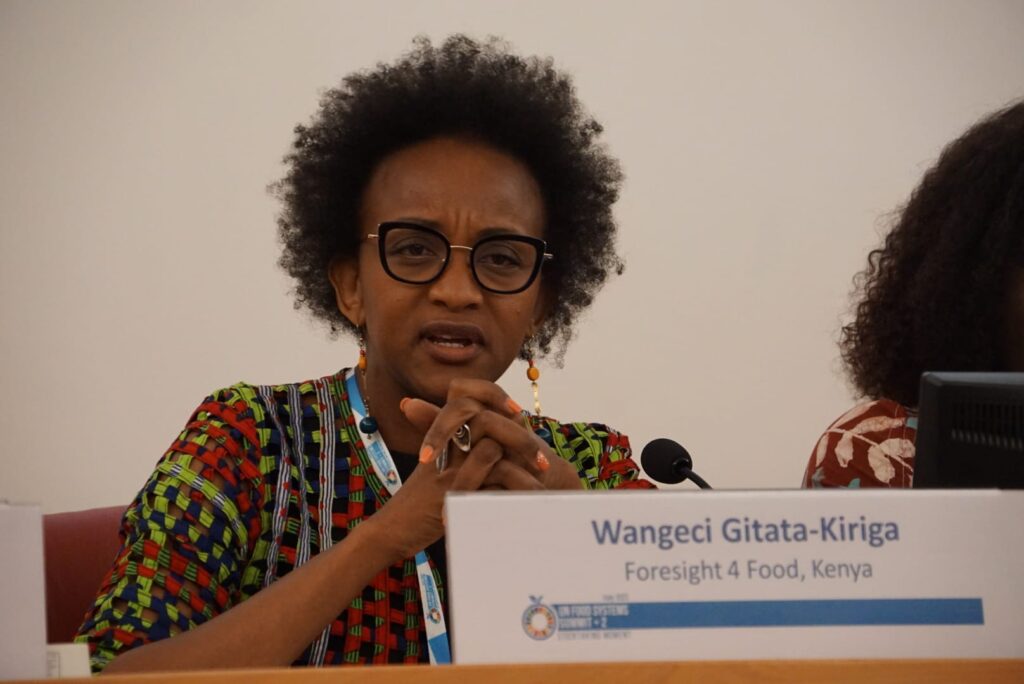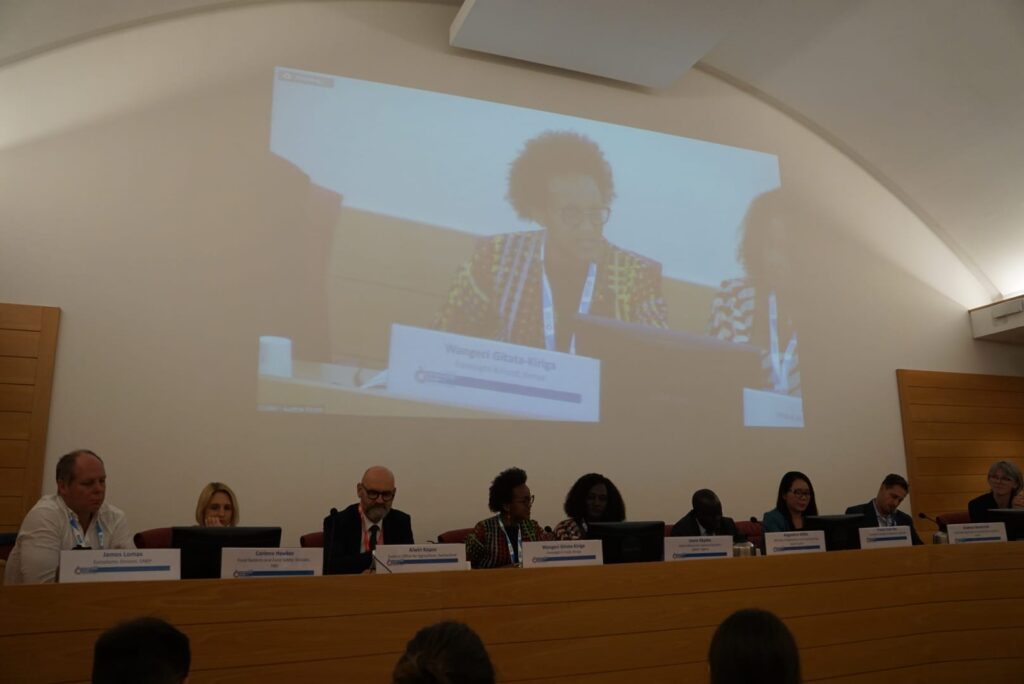by Bram Peters
The UN Food System Summit +2 StockTakingMoment is behind us. It was attended by more than 155 National Food Systems Convenors were in place and 107 countries shared their national food system transformation pathways accounts. 3300 participants, including delegations from 182 countries, 21 world leaders, and 126 ministers (particularly from the Global South) joined.
What highlights and insights remain from the 3-day event in Rome? Joining on behalf of Foresight4Food, I felt it was a mixed bag, with both positives and negatives. Below are some insights, facts, backdrop, and other observations:
First off, a few facts were shared which really hit home:
According to Amina Mohammed, Deputy Secretary General of the UN, we are in the worst possible shape to reach the SDGs. Almost all indicators are lagging behind.
- 2.4 billion people across the globe, mostly women and people in rural areas, did not have consistent access to nutritious, safe, and sufficient food in 2022 (according to the latest SOFI report 2023).
- The world is not on track to reach the SDGs: only 15% of the 140 targets are on track since the 2015 baseline. Close to half of the targets are moderately or severely off-track.
- To achieve the Zero Hunger goal by 2030, IFAD stated that an additional $400 billion investment, per year in food systems is required, meaning efforts must be doubled in half the time. For reference: not doing anything would cost $12 trillion.
- It is projected that, by 2050, 70% of people will live in cities. At the same time, in those areas, consumption of processed and convenience food is increasing, with impacts on obesity, diabetes and other non-communicable diseases.
Some geopolitical and climate change-related dynamics in the backdrop:
- Southern Europe has experienced a heatwave of unprecedented levels, with high temperatures and wildfires from Rhodes to Spain. In Rome, temperatures have peaked at 41.8 degrees Celsius in recent weeks.
- The Russia-Ukraine war and Russia’s intention to withdraw from the Black Sea Grain Deal (BSGD) and a forum with African leaders was to be held in Saint-Petersburg after the summit. According to IFPRI, under the BSGI, about “65% of wheat was exported to developing countries. This includes 725,167 tons of wheat exported through the World Food Programme to help relieve hunger in Afghanistan, Djibouti, Ethiopia, Kenya, Somalia, Sudan, and Yemen. By contrast, about 83% of maize exports under the BSGI have gone to developed countries and China” (IFPRI, July 2023). This comes in the wake of a report that indicated that majority of the Black Sea Grain Deal production was consumed in Europe and used for animal feed.
- Italian host, Prime Minister Meloni, opened the summit, referencing the positive nutritional aspects of the ‘Mediterranean’ diet, but also had just a week earlier co-led the signing of a controversial migration pact between the EU and Tunisia. This was alluded to in her welcoming speech, where she urged for further investment especially in Africa so that jobs are created on the continent and sought in Europe.
- Ethiopian Prime Minister Abiy Ahmed was one of the speakers at the Opening Ceremony. Ethiopia and her northern neighbours are still negotiating on the planned dam along the Nile, which would directly affect food systems in Egypt and Sudan—no mention of cross-border resource sharing in his remarks.
Key takeaways:
- Food systems knowledge has deepened and capacities on food systems approaches have generally grown. This includes how countries use this but also the application within various Rome-based agencies. Now it will need to be seen whether coordination on such a diverse range of issues can improve and whether implementation increases pace. A hint of this integration was seen in the fact that clear links are made to the upcoming SDG conference and the COP28.
- Urgency is recognized as high, which made it very relevant to hold this UNFSS+2 StockTake to maintain momentum. Having a visible and active participation of high-level political representatives showed widespread commitment. However, the lack of substantial presence from Northern countries with commitments to their own national transformations was a missed opportunity.
- ‘Transformation’ was spoken about often, but the sense of real transformation ongoing is not apparent yet. A few insightful examples: the discussion on true pricing of food, a study in Andhra-Pradesh where agro-ecological farm production empirically demonstrated equal economic earning and better social and environmental benefits compared to conventional farming approaches; and the example by Switzerland on the establishment of a citizens’ assembly to offer recommendations for Switzerland’s food policy to break their parliamentary deadlock surrounding agricultural policy (something the Netherlands can learn from?).
- A side event about livestock was interesting with debate about the contribution that the sector has regarding GHG emissions, livelihoods, nutritious food, and what was being done in different parts of the globe.
- It was heartening to hear the enthusiasm in the stories of the national convenors, the driving forces for coordination and collaboration at national levels. However, it was also seen that many countries do not yet have strong institutional mechanisms in place to support cross-sectoral decision-making.
- A lot of important topics were addressed, including multi-stakeholder collaboration; inclusion; school meals; food security in (poly)crises; budgeting and financing for national Action Plans; policy alignment across sectors; and climate resilience. Multiple leaders from South America and EU mentioned agro-ecology. Some topics I missed included tackling unfair international trade agreements and improving global food trade governance (as referenced here in a (Dutch) long read by colleague Bart de Steenhuijsen Piters from WUR).
- Foresight approaches appeared highly relevant, as stakeholders shared the need to scan horizons for upcoming trends; build resilience for anticipatory approaches (WFP shared an example from Niger where less food aid was needed due to improved resilience approaches); and include ‘lived’ (indigenous) interpretations of past and future- alongside scientific evidence- in our transition pathways.
- Accountability did not receive much attention. With the exception of special events on the first day of the UNFSS on measuring and bench-marking, there was relatively little accountability of progress toward promises made at the 2021 Summit. It will be very important, at a next StockTake, to get more metrics and data of countries on their national transformation pathways progress.
Other observations:
- The UN agencies were pleased to see the high-level turnout, especially from the South. Private sector, youth, and indigenous groups were represented in smaller numbers but made active contributions.
- Engagement from member countries, the private sector, civil society as well as the scientific community seemed less than before.
- Limited (or less visible?) participation of Europe and the USA. Whether this is a sign of decreased interest, or because there were fewer planned preparations for UNFSS+2 compared to UNFSS, is yet to be seen.
- (only) A few countries from the global North reported on their own food systems pathways and challenges instead of reporting on their ODA-funded food system support to partners in the global South.
- A counter-summit was organised, raising issues of lack of inclusion and corporate-led influence.
- Quite a few UN Agencies are investing and learning about foresight. For example, the Future of Food and Agriculture publication (FOFA DDT) was presented at a side event. Also, the newly reinvigorated FAO Office of Innovation is actively interested in foresight methods and eager to exchange with Foresight4Food.
- A nice photo exhibition was held in the main atrium, called ‘Food Futures’, funded by the European Commission Joint Research Centre, with the objective to explain food systems and realising that cultural shifts are needed to transform these.
Side-event on multi-stakeholder collaboration
At the Stock Take Moment, Foresight4Food was able to contribute to a side event called ‘Multi-stakeholder collaboration for food systems transformation: From concepts to Action ‘. This side event (see here the recording), organised together with UNDP, UNEP, FAO, Global Alliance for Improved Nutrition (GAIN) and Netherlands Food Partnership focused on the need to bring people together to bring change. How to ensure inclusion, tackle power differences, and create a shared language to help with the national pathways? There is such a diversity of food system stakeholders. In a diverse panel with representatives from Vietnam, South Sudan, Nigeria, Switzerland, and Kenya, the question asked was: ‘How’ do we do a multi-stakeholder collaboration?
Key experiences shared included how the Vietnamese government went down to the local level to collect insights, conveners who actively consulted the grassroots level in South Sudan, iterative rounds of consultations at different levels and regions in Nigeria, and how a citizen’s assembly was established in Switzerland to advise on food systems.
Wangeci Gitata-Kiriga, representing Foresight4Food Initiative, shared how in Kenya, Foresight4Food combines a participatory process with an evidence-based understanding of the current food system and the possible future of the food system. Using participatory visual approaches such as Rich Picturing, stakeholders exchange perspectives, talk openly about power, and start developing a shared language on uncertainties and possible futures of the food system.

The session concluded with the observation that we need to understand ‘transformation’ better, that this requires a huge effort, and needs inclusiveness and diversity. We have a broad range of tools at our disposal that we can use. It is also not about the powerful vs the powerless, but rather also about breaking barriers, creating and maintaining an equal playing field, and involving the unexpected and unusual players.

See the website NFP Connects of the Netherlands Food Partnership for a more detailed summary.